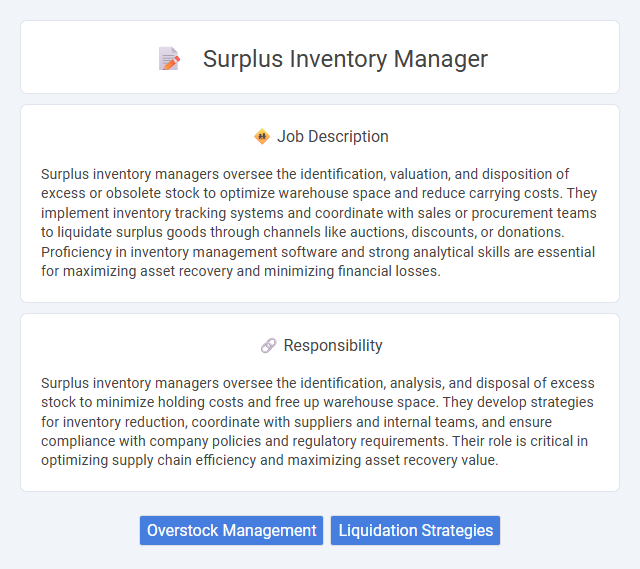
Surplus inventory managers oversee the identification, valuation, and disposition of excess or obsolete stock to optimize warehouse space and reduce carrying costs. They implement inventory tracking systems and coordinate with sales or procurement teams to liquidate surplus goods through channels like auctions, discounts, or donations. Proficiency in inventory management software and strong analytical skills are essential for maximizing asset recovery and minimizing financial losses.
Individuals with strong organizational skills and attention to detail are likely suitable for a Surplus Inventory Manager role, as the job involves managing excess stock efficiently. Those comfortable working with data analysis and inventory control systems may find themselves well-aligned with the responsibilities. Candidates who prefer dynamic problem-solving environments and inventory optimization tasks could potentially thrive in this position.
Qualification
A Surplus Inventory Manager requires strong expertise in inventory control, supply chain management, and data analysis to optimize excess stock handling. Proficiency in ERP systems such as SAP or Oracle and advanced Excel skills are essential for accurate reporting and forecasting. Leadership experience and excellent communication skills enable effective coordination with procurement, sales, and operations teams to minimize financial losses and maximize asset recovery.
Responsibility
Surplus inventory managers oversee the identification, analysis, and disposal of excess stock to minimize holding costs and free up warehouse space. They develop strategies for inventory reduction, coordinate with suppliers and internal teams, and ensure compliance with company policies and regulatory requirements. Their role is critical in optimizing supply chain efficiency and maximizing asset recovery value.
Benefit
Surplus inventory managers are likely to enhance company profitability by efficiently identifying and liquidating excess stock, reducing holding costs and freeing up valuable warehouse space. They probably improve supply chain responsiveness through better inventory turnover and accurate demand forecasting, minimizing the risk of obsolete products. Effective surplus inventory management may also strengthen supplier relationships by enabling more informed purchasing decisions and reducing emergency orders.
Challenge
Managing a surplus inventory manager role likely involves the challenge of accurately forecasting demand fluctuations to minimize excess stock while avoiding shortages. It probably requires strong analytical skills to identify obsolete or slow-moving items and develop strategies for liquidation or repurposing. The position may also demand effective cross-departmental communication to align inventory control with procurement and sales objectives, reducing carrying costs and maximizing asset utilization.
Career Advancement
Surplus inventory managers oversee excess stock to optimize warehouse space and minimize carrying costs, playing a crucial role in supply chain efficiency. Mastery in data analytics, vendor negotiation, and inventory control systems enhances career progression opportunities into senior supply chain or operations management roles. Pursuing certifications like APICS CPIM or CSCP can accelerate advancement by demonstrating expertise in inventory and production management.
Key Terms
Overstock Management
Surplus inventory managers focus on overstock management by analyzing inventory levels to identify excess stock and implementing strategies to efficiently reduce surplus. They utilize data-driven forecasting tools to optimize inventory turnover, minimize holding costs, and improve cash flow. Expertise in coordinating with sales, procurement, and logistics teams ensures effective redistribution, liquidation, or return of overstocked products.
Liquidation Strategies
Surplus inventory managers implement targeted liquidation strategies to efficiently convert excess stock into revenue while minimizing holding costs. Techniques such as bulk sales, online auction platforms, and partnerships with liquidators help accelerate inventory turnover and recover capital. Data-driven analysis ensures optimal timing and pricing to maximize returns from surplus assets and reduce storage liabilities.
 kuljobs.com
kuljobs.com